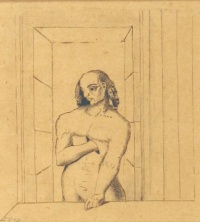Mind
From The Art and Popular Culture Encyclopedia

|
"The human mind . . . operates by association. With one item in its grasp, it snaps instantly to the next that is suggested by the association of thoughts, in accordance with some intricate web of trails carried by the cells of the brain." Vannevar Bush, As We May Think (1945) |
,_Utriusque_cosmic_maioris_scilicet_et_minoris_metaphysica.jpg)
Illustration: Diagram of the human mind, from Utriusque cosmi maioris scilicet et minoris metaphysica by Robert Fludd
|
Related e |
|
Featured: |
A mind is the set of cognitive faculties that enables consciousness, perception, thinking, judgement, and memory—a characteristic of humans, but which also may apply to other life forms.
A long tradition of inquiries in philosophy, religion, psychology and cognitive science has sought to develop an understanding of what mind is and what are its distinguishing properties. The main questions regarding the nature of mind is its relation to the physical brain and nervous system – a question which is often framed as the Mind-body problem, which considers whether mind is somehow separate from physical existence (dualism and idealism), deriving from and reducible to physical phenomena such as neurological processes (physicalism), or whether the mind is identical with the brain or some activity of the brain. Another question concerns which types of beings are capable of having minds, for example whether mind is exclusive to humans, possessed also by some or all animals, by all living things, or whether mind can also be a property of some types of man-made machines.
Whatever its relation to the physical body it is generally agreed that mind is that which enables a being to have subjective awareness and intentionality towards their environment, to perceive and respond to stimuli with some kind of agency, and to have consciousness, including thinking and feeling.
Important philosophers of mind include Plato, Descartes, Leibniz, Kant, Martin Heidegger, John Searle, Daniel Dennett and many others. The description and definition is also a part of psychology where psychologists such as Sigmund Freud, William James have developed influential theories about the nature of the human mind. In the late 20th and early 21st century the field of cognitive science emerged and developed many varied approaches to the description of mind and its related phenomena. The possibility of non-human minds is also explored in the field of artificial intelligence, which works closely in relation with cybernetics and information theory to understand the ways in which human mental phenomena can be replicated by machines.
The concept of mind is understood in many different ways by many different cultural and religious traditions. Some see mind as a property exclusive to humans whereas others ascribe properties of mind to non-living entities (e.g. panpsychism and animism), to animals and to deities. Some of the earliest recorded speculations linked mind (sometimes described as identical with soul or spirit) to theories concerning both life after death, and cosmological and natural order, for example in the doctrines of Zoroaster, the Buddha, Plato, Aristotle, and other ancient Greek, Indian and, later, Islamic and medieval European philosophers.
Etymology
The original meaning of Old English gemynd was the faculty of memory, not of thought in general. Hence call to mind, come to mind, keep in mind, to have mind of, etc. Old English had other words to express "mind", such as hyge "mind, spirit".
The meaning of "memory" is shared with Old Norse, which has munr. The word is originally from a PIE verbal root *men-, meaning "to think, remember", whence also Latin mens "mind", Sanskrit manas "mind" and Greek μένος "mind, courage, anger".
The generalization of mind to include all mental faculties, thought, volition, feeling and memory, gradually develops over the 14th and 15th centuries.
See also
- Cognitive sciences
- Conscience
- Consciousness
- Explanatory gap
- Hard problem of consciousness
- Mental energy
- Mind-body problem
- Mind at Large
- Neural Darwinism
- Philosophical zombie
- Philosophy of mind
- Problem of other minds
- Sentience
- Subjective character of experience
- Theory of mind

